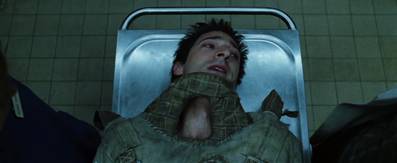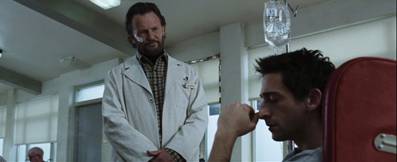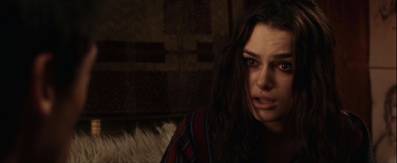|
John
Maybury's first feature film, Love is the Devil
(1998), was an arresting portrait of artist Francis Bacon,
seen through the eyes of an avant-garde filmmaker dipping
his toes into more mainstream waters. It was a very British
affair, with more than a hint of influence from Maybury's
mentor, Derek Jarman. The Jacket (2005)
has several differences apparent from the off. It is Maybury's
first American studio picture, with a budget and corporate
constraints to match. There is less of a feeling of auteurship
in this movie because of this. The writing process was a
formal one that Maybury had little involvement in and all
indications point ironically to an altogether more straightjacketed
production. None of this is to say Maybury has completely
shunned his avant-garde roots. There are many devices used
within the movie lifted from the experimental fringe of
cinema Maybury hails from. Not to mention the plot itself
is not a typical Hollywood narrative, and there is a definite
indie sensibility behind the studio ramifications.
Jack
Starks (Adrien Brody) is shot in the head on the front line
of the first Gulf War, yet survives. After a period of recuperation
and being decorated as a brave soldier he is discharged
and makes his way home. Here he helps a young woman and
her daughter to restart their car before hitching a lift
from a stranger. The stranger shoots a policeman who stops
them and makes a run for it. In the confusion Starks is
charged with the murder and presuming his head injury is
the cause is omitted to a mental institution. At the hospital
Starks is exposed to experimental treatment by Dr. Becker
(Kris Kristofferson) involving being put in a straightjacket,
drugged, and shut in a morgue draw for short periods of
time. It is here Starks experiences time travel, being propelled
fifteen years into the future, and learns of his imminent
murder in the present, leading to a race against time to
try and stop his fate, with the help of a young woman named
Jackie (Keira Knightley).

It
is clear from the unconventional editing style apparent
in the opening sequence that this will not be your average
Hollywood picture. A montage of abstract nature cobbles
together the relevant backstory and gives you an indication
into the fragmentary nature of Starks' mind. With documentary
and news footage intercut with the fictional narrative,
the first part of this sequence, given the subject matter,
put me in mind of Sam Peckinpah's classic opening montage
in Cross of Iron (1976). There is also
something a little Kubrick-esque about this first sequence,
and indeed the whole film. Maybe it's the themes laid out;
war, control, manipulation, the questioning of morality
– the two main films I have in mind are Full Metal
Jacket (1987) and A Clockwork Orange
(1971). But there is also a masterful artistry to it all
that also favours a Kubrick comparison. The voiceover kicks
in and the scene is set within minutes. The political climate
is highlighted, Starks' injury is shown, he is denoted as
a good soldier and ethical man, and we are ready to follow
this character already. This is what good characterisation
should be like, and it's all in the editing; quick, snappy,
intelligent, and to the point. I just hope the studio honcho's
over seeing this production have taken notice!
Once
we enter the perimeter of the institution the pace changes
noticeably. Here we move to the quiet, clinical atmosphere
present in One Flew Over the Cuckoo's Nest
(1975). There is a steady menace to the slow moving scene
that first greets the audience in this location, mirrored
by Brody's drugged and apathetic Starks. His performance
stands out like a pop-up book with every movement. I have
been a fan of Adrien Brody since I saw him in Spike Lee's
Summer of Sam (1998) and every role he
embarks on seems to improve my view of him. To find that
Starks was originally to be played by Mark Wahlberg shocks
me, as I feel it would not only have been a very different
film but a lesser one. Brody brings a gravity to the screen
that compliments the film's style, as does the tandem performance
of Knightley. She exudes a darkly beautiful cynicism, yet
a frailty which matches Brody's character. She also accomplishes
a convincing American accent. The scenes that feature both
lead characters sparkle with screen chemistry.
When
Starks first enters the future, and Jackie's life, Maybury
handles the scenes with a mix of sentimentality and melodrama
which turns to David Lynch style surrealism when Jackie's
true identity is discovered. It is at this point the film
works best, amalgamating generic form seamlessly, and creating
a true feeling of disorientation, identifying the audience
with Starks' situation. The performances are the key to
this, as there is something lacking in the potency of the
script that I attribute to the separation of the mainstream
writers from the independent-minded direction of Maybury.
This seems the case throughout the movie. There are times
where all elements work in harmony together, like the sequence
just detailed, although there are moments where it all seems
too contrived and predictable, which for a genre-buster
is a disappointment. The stylistic elements and more unusual
narrative thrust does connote Lynch, as many critics have
noted, although the more linear and conventional progression
(the romance and eventual resolution of sorts), are safeguards
Lynch has never had time for. In his movies there is an
irony to resolution, if there is any at all, and romance
is dealt with in a much more enigmatic way. The characters,
with the exception of the protagonist, are also painted
in rather broad brush strokes in The Jacket.
Maybe this high concept format, along with a free play with
genre, is more comparable to Hitchcock, who has also been
cited as an influence by critics, although I'm cautious
to ever compare a contemporary production with the specificity
of Hitchcock's work.

It
is the not the fault of the performances that create problems
though, as all are top quality. Kristofferson is excellent
as Dr. Becker. While there is a little of the pantomime
villain about him, I would say that is more down to the
scripting than performance, as he tries to inject a humanity
into the character that is sometimes compromised by the
constraints of the productions writing. It must be noted,
however, Brody eclipses the menace of the Becker character
in most scenes with his sheer emersion in the role of Starks.
This is most apparent in their meeting in the future where
Starks confronts the old and frail Becker. The intensity
of the moment is somewhat diminished by the polarity of
the two characters. The incredibly forceful and driven,
although sick, Starks is contrasted with the impotency of
a frail Becker, to show a shift of power. It would have
worked better if the aged Kristofferson matched the authority
of Brody's performance. As it is, there is a spark missing
in the scene that would have given it the boost needed here
and in a few of the films weaker sequences.
The
understated performance from Jennifer Jason Leigh is a brilliant
addition to the cast, although her character suffers from
the same slight inflexibility as Becker. Classical narrative
influences dictate her Dr. Lorenson character as the 'helper'
(along with a nice supporting role by Daniel Craig), flip
side of Becker's 'villain'. It is these strongly defined
characters that make the film a little too clunky in places.
It's disappointing to have these discrepancies when there
is such a well-drawn central character.
Stylistically
there is a mixture of influences present, some of which
are to be expected from an experimental filmmaker of Maybury's
calibre; Bunuel, Jarman, Lynch etc. (he also explored silent
cinema for the production). There is also the influence
of computer-generated imagery, fully available for the first
time to Maybury. He embraces this availability and uses
CGI effectively and relatively sparingly. There is always
a danger of over doing it, which most Hollywood filmmakers
are happy to do, so it is good to see British restraint
being exercised in this way! Confined to the treatment-induced
time travel of Starks, the CGI works in an abstract sense
that suits the form and disorientating theme of the movie.
There is also great atmospheric lighting shaping the mise-en-scene,
and much attention has been paid to the colour palette,
ensuring a sleek, uniform look throughout the production
and an artistic and disturbing aesthetic.
Its
sensitive politically topical themes involving the Gulf
War and its allusions to 9/11 together with an off beat
concept, strong performances, arty mise-en-scene and intelligent
editing style go some way to compensate for The
Jacket's shortcomings in writing, although there
is nothing that can make me forgive the insubstantial and
anti-climactic sell-out of an ending. It tarnishes the entire
film to receive such a weak final scene, and to find out
on the DVD extras (detailed below) alternative endings were
shot, all offering a much more fitting resolution, sours
it further. It is this exact intervention by the studio
I was fearful of prior to viewing and it is a shame John
Maybury did not see fit (or did not have the power) to finish
the piece with the same strength it started so hopefully
with.
The Jacket is a dark film, and I mean visually
dark, with cinematographer Peter Deming at times pushing
the light levels almost as low as he did in David Lynch's
Lost Highway, presenting similar problems
for non-film formats and their more restrictive contrast
ratios. The transfer here copes reasonably well, though
there are some compression artefacts in the darker scenes
and fine detail is sometimes lost. The restricted colour
palette is faithfully reproduced, but be warned – to catch
all of the action the only real way to watch the film is
in a completely darkened room.
The picture is framed at 2.40:1 and enhanced for widescreen
TVs.

There
is little showing off in the 5.1 soundtrack, but inevitably
and approprately the most dynamic use of the full sound
stage comes during Starks' flash-forward sequences, when
we are put right inside his head and treated to a blast
of deliberately disorientating but well layered audio-visual
information. Separation here is very good.
The
Jacket: Project History and Deleted Scenes
(28:16) is effectively three extra features rolled into
one. The Jacket Project History seems to be in
place of a commentary track, with interviews with the main
actors, the director and writer. It details how Maybury
got hold of the script, some writing insight, and how the
actors were chosen for their roles. It is a worthy extra
on the disc, although it really is no substitute for a good
commentary. The incorprated Additional Scenes provide
an interesting insight into some sequences that were left
out of the final cut. For most of them I was left wondering
why they were removed, as I think many of these scenes would
have added to the film. The Alternate Endings I
found both an interesting and important addition to the
DVD as well as a total frustration. Mainly because all the
alternative endings are more inspired than the one used
in the final cut, and it infuriates me that the ambiguous
ending could not have been firmed up with a bleaker perspective,
as shown on a couple of these alternative scenes. [I would
add that alternative ending #2 would effectively have rendered
the film a partial remake of Jacob's Ladder,
and I'd lay money on that being the reason for not going
with it – Slarek.]
The
Look Of The Jacket Featurette (9:03) explores
how Maybury envisioned the film and the use of computer
generated imagery in the stylistics of the movie. There
is information about the colour palette and influences for
the avant-garde sections of the film. Of special interest
to those interested in production design and special effects.
The
Theatrical Trailer (2:21) does
an OK if slightly misleading job of selling the film.
A
film that is worthy in giving the mainstream something to
think about, although falls down on its Hollywood constraints.
Yet another film where Brody excels, and the style of the
piece is what one should expect from a John Maybury film.
The DVD features are hardly excessive and a commentary by
the director and perhaps actors and writers would have made
a difference. In this time of being spoilt with a dazzling
array of features this disc does leave something to be desired,
but what is on there contains valuable and interesting information.
|